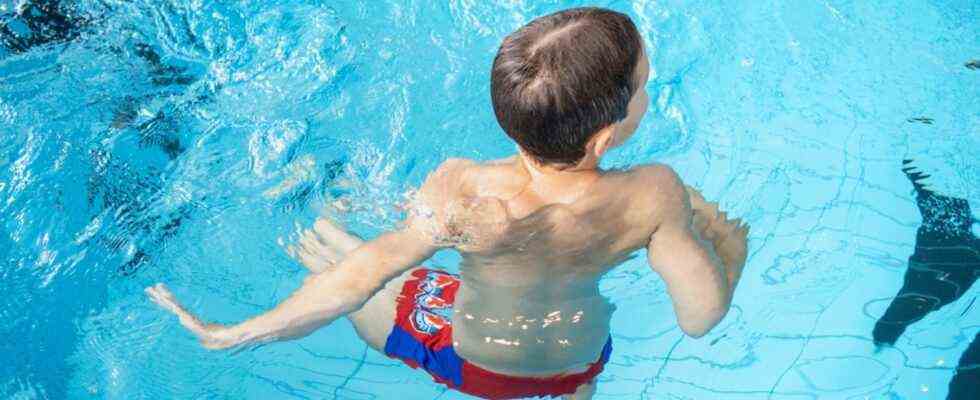It was well-intentioned by the Bavarian state government when it launched two aid programs at the start of the school year for two groups that are particularly affected by the side effects of the corona pandemic. Because of the lockdown, the sports clubs had to paralyze their operations for a long time – and that’s why many children could no longer let off steam.
In order to counteract the decline in membership on the one hand and the lack of exercise on the other, the Ministry of the Interior has come up with two voucher variants that are settled via the Bavarian State Sports Association (BLSV): Elementary school children who are new to a BLSV club receive one Grant of 30 euros each for the annual membership fee. And swimming courses for preschoolers and first graders that end with the seahorse badge are even supported with 50 euros each.
In total, the ministry is making more than six million euros available for the one-year campaign: “3.4 million euros are earmarked for the club annual membership program and 2.8 million euros for the swimming program.” The ministry does not yet know how enthusiastically the offer was accepted by the beginning of the autumn break: “We expect the specific figures to be available by the end of the year.”
In Munich, the interim results are mixed. “The vouchers are being used very well,” says Björn-Alexander Schmidt, chairman of the Wacker hockey club. “Around 70 to 80 percent of the new members submit it.” His counterpart Kurt Damaschke from SVN Munich, on the other hand, sees the vouchers as “more of a kind of campaign gift” shortly before the federal elections. Of the around 200 new registrations in recent times, only a quarter arrived with it. Beppo Brem, who, as the former president of SV 1880, current chairman of the BLSV district in Munich and acting city councilor for the Greens, has insights into the topic from various perspectives, sums up: “It works according to the watering can principle. It helps, but it doesn’t move so much. “
With a grant of 30 euros you won’t get very far in a big city
Swimming is “a very big issue”, admits Brem, “because this ability has decreased dramatically”. But he is not the only one who doubts whether the measures taken by the government are the right ones. “One should have aimed less at the seahorse, but rather at the infrastructure,” says Brem. “We have too few pools and indoor swimming pools. Investing the money for this capacity would have been better.”
Kurt Damaschke sees it that way too. Apart from the fact that not every school swimming pool is suitable, not every one is available as is necessary for a regular club sport. “We wanted to do something, but we didn’t get any times,” he says. “If we don’t have a hall, we can’t send the children to courses either.”
Damaschke’s association in Neuperlach was particularly hard hit by the corona pandemic. During the second wave, more than a quarter of the members canceled their membership, from more than 6,000 the number fell to 4,500; There was a decline in the number of children and fitness programs in particular. Since the SVN was allowed to resume its sports operations in the summer, the number has risen again – to more than 5000. But that is not due to the voucher program, says the chairman; With a grant of 30 euros you don’t get very far in a big city, which is enough in rural regions at best. “I don’t know of any club in Munich where the fees are so low that they can cover an annual fee,” says Damaschke. The admission fee alone costs between ten and fifteen euros, the monthly contributions amount to at least five euros – so the grant is only enough for a quarter of a year.
“Small clubs may even have come out with a plus.”
Regardless of all support measures, Beppo Brem has generally observed an increase in the number of sports clubs, especially children “who have been kept away from exercise for a year and a half”. The clubs are also “full of zest for action”. Of course, some were already during the lockdown. While most of the club officials complained about the confusion of regulations and quarreled about what was no longer allowed, “we looked at what was still possible – and then offered it,” says HC Wacker boss Schmidt. If five people train together outdoors, then several groups of five have practiced on the field at a suitable distance. This was how they kept the members happy.
His club also benefited from the fact that he had his own facility, which he was able to use again when the district sports facility next door was still closed. The reward for the effort: HC Wacker announced its 1000th member in mid-October – it has never had that many.
But basically there are no uniform lessons from the Corona crisis at the 650 sports clubs in Munich. “Small clubs may even have come out with a plus because they saved the user fees for the district sports facilities or schools,” speculates the BLSV district chairman Brem. “The bigger ones tended to have problems because they had running costs for their systems.”
There are correspondingly different demands that the clubs are now deriving. Björn-Alexander Schmidt argues for a “much more individual view” of the clubs, Kurt Damaschke for a general upgrading of sport: “I long for the day when you no longer talk about voluntary performance in sport, but see politics as a compulsory task . ” In any case, he no longer wants to be fobbed off with vouchers alone.

